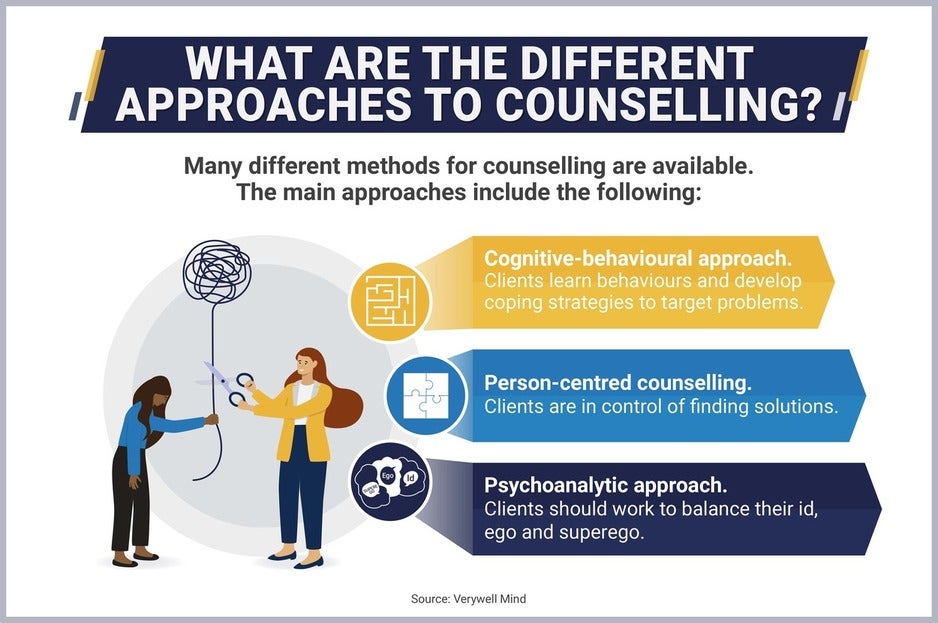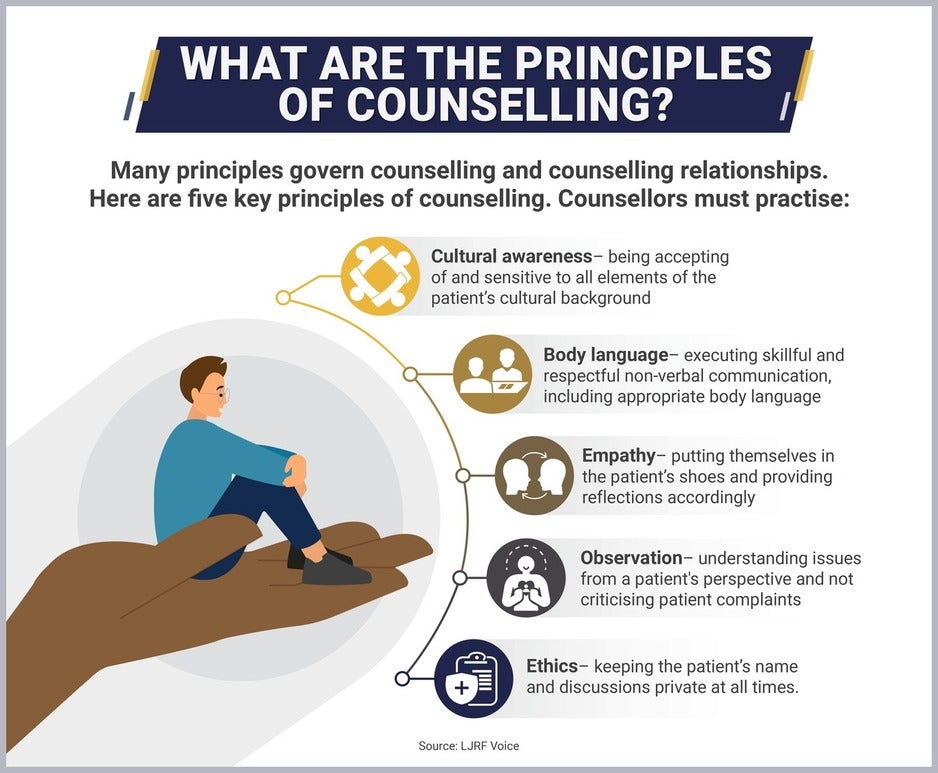
Modern life can be extremely stressful, and that stress impacts the lives of people around the world. The National Study of Mental Health and Wellbeing, 2020-2021, from the Australian Bureau of Statistics (ABS), found that 15 per cent of Australians experience either high or very high levels of distress in their lives.
Fortunately, many who are struggling seek help. A total of 31 per cent of all women in Australia and 13 per cent of all men experiencing distress seek professional help, meaning that more Australians than ever before will require some type of counselling. For this reason, understanding in more detail what counselling entails – including the stages of counselling, different approaches, the principles of counselling and what skills are required to be a successful counsellor – is important.
If you want to be empowered to help others, JCU’s 100% online Graduate Diploma in Psychology (Bridging) will give you the skills you need. Whether you want to gain counselling skills to help you in your current career, or you want to begin the pathway towards becoming a registered psychologist, you can reach your goals with JCU.
What is counselling?
Counselling is a form of therapy in which an individual, a couple or a family meets with a professional counsellor to discuss various issues. Counselling should always be professional, confidential and non-judgemental.
What is the purpose of counselling?
Counselling has many purposes, including the following:
- Giving people the opportunity to share their views, be listened to and gain new perspectives
- Helping provide clarity around issues
- Helping people work towards a desired outcome
- Encouraging personal growth.
Reasons people seek out counselling
People may seek out counselling services to help them deal with specific issues, concerns or circumstances. These include, but are not limited to:
- Stress and anxiety
- Depression
- Grief and loss
- Parenting
- Addiction
- Abuse
- Trauma
- Relationship and/or communication issues
- Exploration of sexuality and/or gender identity
- Life transitions such as divorce, job changes, moving or the birth of a child.
What are the principles of counselling?
To provide the very best support to clients, understanding the principles of counselling is important. The principles provide an essential framework for counsellors to operate within, and counsellors should practise them when interacting with clients.
Cultural awareness
At all times, a counsellor must be culturally conscious. This means that counsellors must be actively aware of how their culture and the culture of their clients have shaped their values, beliefs, biases and worldviews.
They must be acutely aware of any cultural differences between themselves and their clients and actively reflect on their responses at all times. This is important for establishing a mutually respectful relationship, contextual understanding and administering the most effective approach.
Body language
Listening attentively to a client is critical in counselling, and being cognizant of body language is an essential principle of counselling. Counsellors must endeavour to maintain eye contact and must also be conscious of their movements and the distance that they maintain between themselves and their clients.
In general, counsellors must maintain a professional distance and demeanour and be aware that touching, staring, and sitting or standing close to their clients may cause them considerable discomfort. They should also be aware that there are cultural differences in nonverbal communication, and ensure they are being respectful of those differences when communicating with clients.
Observation
In counselling sessions, what’s not said can be as important as what is.
Counsellors should ensure that they not only actively listen to what their clients tell them but also take the time to observe clients’ body language and other non-verbal cues, such as sadness, discomfort or anxiety when talking about certain events or individuals. The clues can help counsellors identify issues in more depth, especially if their clients aren’t comfortable talking about certain subjects.
Respect for the autonomy of others
One critical principle of counselling is respect for the client’s autonomy. A counsellor must always respect that the client has choices, and they must not attempt to unduly influence what a client does.
The role of the counsellor is to make their clients aware of the choices available to them and what the consequences of these choices might be, rather than forcing them to do something they don’t want to do.
Propriety
The principle of propriety dictates that counsellors always act in a way that contributes to client welfare, including not causing harm and contributing to the greater good of society. Because the goal of counselling is to help and support clients, this is an essential part of being a counsellor.
They must also act preventatively if they believe their client will cause themselves or others harm, including early intervention if necessary.
Integrity
As counsellors deal with a range of sensitive, personal and private issues, integrity is essential. Counsellors must respect their clients’ privacy and live up to the high amount of trust that is placed on them. This is also an integral part of abiding by confidentiality standards, as outlined in Australia by the Privacy Act 1988.
They must also always conduct their business in a way that positively reflects the broader profession.
Ethics
The Australian Psychological Society (APS) combines the principles of proprietary and integrity to provide a comprehensive code of ethics for psychologists and counsellors.
The standards are derived from these general principles and form the minimum expectations that psychologists and counsellors must adhere to. Registered psychologists who don’t meet these standards may be subject to a review from an ethics committee.
What are the different types of counselling?
Many different types of counselling are available, including the following:
- Vocational and career counselling
- Relationship and marriage counselling
- Trauma counselling
- Student counselling
- Grief and loss counselling
- Depression and anxiety counselling
- Family therapy.
In what settings does counselling occur?
Counselling can occur in numerous different settings and help different groups of people. These settings include the following:
- Private practice – often delivering relationship, grief and loss or trauma counselling
- Schools – delivering career counselling or other types of counselling
- Hospital care facilities – delivering mental health or trauma-related counselling
- Education or legal system – offering services to those who may be struggling within the legal system and advocating for change.
Australian counselling resources
Explore some of the resources available for finding mental health support and tools in Australia.
- Australia Counselling: A comprehensive directory of counselling and psychological services available in Australia.
- Australian Counselling Association: A registration body for counsellors and psychotherapists in Australia with more than 11,000 members.
- Beyond Blue: A hub of information about depression, anxiety and suicide prevention, with resources to help find mental health support.
What are the different approaches to counselling?
There are many different approaches that a counsellor can take when working with a client. Here are three approaches that a counsellor may elect to use.
Cognitive-behavioural approach
The cognitive-behavioural approach is based on cognitive-behavioural therapy (CBT), which Aaron Beck developed in the 1960s. Beck observed that his clients had a constantly negative and self-defeating internal dialogue and that this dialogue influenced their behaviour.
Based on this observation, he developed CBT, which counsellors use to change the thoughts, beliefs and attitudes of their clients and how they deal with their emotional problems. In particular, CBT focuses on restructuring negative thoughts and helping clients overcome barriers to participating in activities.
Person-centred counselling
Founded in the 1950s by psychologist Carl Rogers, person-centred counselling (PCC) operates on the assumption that the client is an expert on themselves and has the internal resources required to understand themselves and set their own direction. The role of the counsellor, then, is to provide an environment that meets certain conditions:
- Psychological contact: A mutual understanding exists between the client and the counsellor.
- Client congruence: The client is vulnerable.
- Counsellor congruence: The client feels comfortable disclosing personal issues.
- Unconditional positive regard: The counsellor unconditionally accepts the client and cares for the client.
- Empathetic understanding: The counsellor validates the client’s feelings.
By providing this environment, the counsellor can work with the client to help establish positive self-worth, self-esteem and self-image.
Psychoanalytic therapy
Sigmund Freud developed the psychoanalytic approach to counselling. Psychoanalysis focuses on the impact of the unconscious mind on function and behaviour. Using free association, a technique in which clients are asked to verbalise everything that comes to mind, counsellors focus on locating and releasing powerful emotions that may be trapped or repressed.

What are the stages of counselling?
To treat patients according to the principles of counselling, certain steps and processes must be followed. Among these are the different stages that counsellors go through with their clients. The stages are as follows:
Stage 1: Building a relationship
Trust is absolutely essential in all counselling relationships. In the first stage, the counsellor establishes a rapport by exploring the issues affecting the client.
This relationship building typically starts at the first interview in which a counsellor’s verbal and non-verbal signs demonstrate an investment in the process. Ideally, the counsellor will display exceptional listening skills to build a positive foundation for future dialogue.
Stage 2: Assessment and formulating the issue
While the counsellor and the client build rapport, the counsellor identifies the issues that the client needs to address. To do this, the counsellor carefully listens and asks questions to understand as much as possible about the client’s situation, for example, home and work life, education and relationships. The counsellor must dig below the surface to understand the nature of the client’s concerns, including important triggers, stressors and environmental factors.
Stage 3: Formulating counselling goals
Counselling is about far more than discussing an issue; it’s about setting and working towards realistic goals. The counsellor and the client must develop these goals collaboratively, and the client must commit to actively working towards accomplishing them.
Stage 4: Problem-solving
A counsellor’s approach to problem-solving depends on the counselling method and the situation that the client faces.
For example, a counsellor who has opted for a cognitive-behavioural approach may suggest that the client engages in different activities to help alter their behaviour. Alternatively, a counsellor who’s opted for a person-centred approach will create an environment where the client can work towards better self-esteem.
Stage 5: Termination and follow-up
If the counsellor and the client have agreed on a definition of success and those goals have been achieved, the final stage of counselling is the termination of the relationship.
The counsellor must plan carefully with the client to ensure that termination can occur without anger, anxiety or risk of ongoing issues or relapses.
Alternatively, a counsellor may refer the client to another professional if further help is needed.

What skills do you need to be a counsellor?
Counsellors must actively put the principles of counselling into practice; this requires certain skills. Here are some important skills required to be a counsellor.
Self-awareness
Counsellors encounter challenging situations with their clients daily. To navigate the challenges, counsellors must have high self-awareness and be open to growth within their profession.
They must also be aware of their personal weaknesses, including gaps in their communication skills and in how they react to clients, to ensure that their focus is always on the client.
Counsellors must be committed to improvement.
Empathy and attunement
To succeed, counsellors must continually work on empathising with clients by actively listening and communicating. Empathy gives counsellors the patience and understanding required to ensure that all clients receive the very best care.
For counsellors, empathy means understanding and connecting with clients and exhibiting the willingness and ability to see a situation from their clients’ perspectives.
Unconditional positive regard
The concept of unconditional positive regard essentially states that counsellors must be supportive and accepting of their clients; they must be non-judgemental, regardless of their clients’ decisions or actions. This helps promote in clients unconditional positive self-regard: a feeling of value unconnected to outside expectations.
Genuineness
In all their interactions with their clients, from the first interview to termination, counsellors must be genuine. Genuine means that their verbal and non-verbal cues (including body language) demonstrate their honest investment in their clients and their clients’ outcomes.
Genuineness helps to build a solid foundation of trust and form a positive working relationship.
Attentiveness
To ensure that their clients are valued and listened to, counsellors must be as attentive as possible at all times.
Attentiveness can be displayed in numerous ways. For example, counsellors can audibly show attentiveness by encouraging their clients to continue speaking by using phrases such as ‘go on’ or by asking them to repeat important elements of their statements. Counsellors can also show attentiveness by repeating and clarifying their clients’ concerns, as well as by nodding and maintaining eye contact.
Counselling in the future
As Australians continue to live busy and demanding lives, the need for qualified, well-trained counsellors will continue to increase. By applying the principles of counselling and the skills they learn through education and training, aspiring and current counsellors can ensure that they provide their clients with the highest quality care and that their clients – and society at large – benefit as a result.
Counselling skills can also be beneficial in a number of different fields, from healthcare to human resources. If you want to develop your counselling skills, JCU’s online Graduate Diploma of Psychology (Bridging) includes the subject ‘Principles of Counselling’, which explores this area in greater depth and will give you practical tools you can apply to a number of different roles. It can also be the first step towards becoming a registered psychologist.
To learn more about the opportunities you can gain with our 100% online Graduate Diploma of Psychology (Bridging), reach out to one of our Enrolment Advisors on 1300 535 919 or email learn@online.jcu.edu.au.
Find out more about JCU’s online Graduate Diploma of Psychology (Bridging).
Get in touch with our Enrolment team on 1300 535 919







